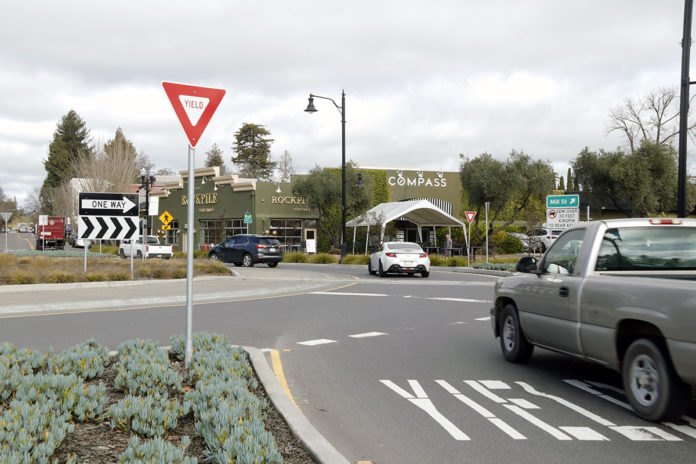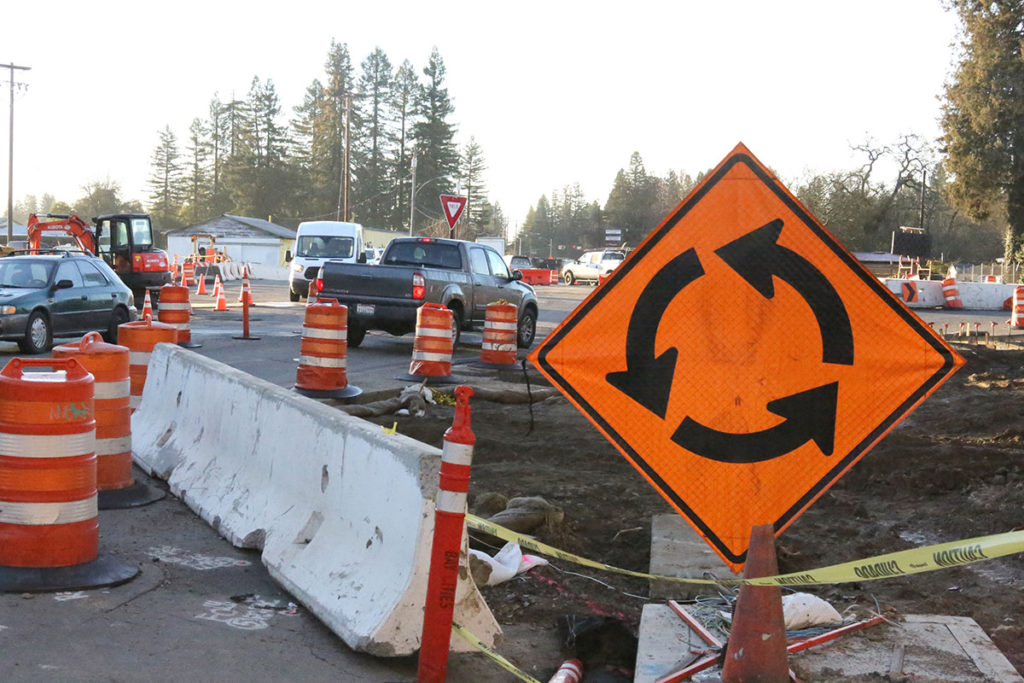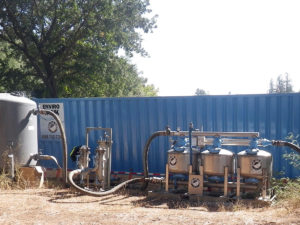
The Healdsburg Roundabout that greets northbound visitors to the downtown area, at the 5-way intersection of Mill and Vine streets and Healdsburg Avenue, has proven its worth in traffic control. The rush-hour jams that were projected by pessimists have failed to materialize, and while the traffic can be heavy it rarely comes to a standstill.
Larry Zimmer, the city’s Public Works director and engineer, said the Roundabout is fulfilling its intended use. “The goal of a roundabout is intentionally to slow traffic so that a cyclist can safely go through and pedestrians can safely cross. It does that.”
And while the Roundabout has been operational since late 2018, and was accepted by the city as complete in August 2020, a lingering dispute between the city, its contracted engineering firm and the contractor chosen to construct the project was only resolved last week, on Jan. 16. That outcome resulted in a $1.15 million settlement in the city’s favor.
Background
Initially scheduled to be a 450-day job, about a year and a quarter, the project went out to bid in February 2014 and a contract was awarded to Bay Cities Paving and Grading in April of that year for their low bid of $10,318,540.

Construction officially began in June 2016, but due to a variety of circumstances the project did not meet its 450-day goal. A ribbon-cutting ceremony was held in November 2018, declaring the Roundabout operational, but lingering legal and bookkeeping questions kept the project alive until the August 2020 date when the city accepted it as complete.
Even then, however, the dispute over the amounts billed for the treatment of contaminated groundwater was alive. It was only settled this month with this final settlement.
The engineering firm GHD was paid $197,000 to prepare the EIR, $1.17 million for the design, and $2.86 million for construction management. (The construction management cost was high due to the extended time it took to complete the project.)
GHD’s estimate for groundwater that would need to be treated was only 20,000 gallons, projected at a per-gallon rate.
But during construction, Bay Cities treated 1,388,900 gallons of groundwater in the first month alone before the task was removed from the contractor’s scope, because it was billing for water treatment at the per-gallon rate set for a much smaller quantity.
A smaller quantity means a higher price per unit; larger quantities have a lower price per unit. “And once they started pumping so much water, the city realized that, wait a minute, this is outrageous,” said Zimmer. “We’re not going to be able to pay this price to continue pumping water.” The city of Healdsburg took the job away from Bay Cities, and directly hired a separate contractor to treat the contaminated water at a negotiated rate of about $10,000 per month.
Bay Cities didn’t like that and filed a complaint, but the city held firm. “It was completely justified for us to take this item over at that point,” Zimmer said. “But the problem was, a lot of water had been treated, and from the time it had been treated up until the close of the project, that issue had not been resolved.”
Long Story Short
The Consent Calendar item of Jan. 16 includes a staff report that reads, “During the construction of the project a claim was filed by the contractor, Bay Cities Paving and Grading, Inc. (Bay Cities) regarding the treatment of contaminated water. The claim between the City and Bay Cities was settled on August 17, 2020. The City believes that the source of the claim was to some degree the responsibility of the designer, GHD. After failed attempts to negotiate with GHD the City of Healdsburg filed a Complaint for Damages against GHD.”

It has taken over three years, but the extended negotiation between the city of Healdsburg, Bay Cities Paving and Grading, and GHD, finally resulted in a settlement. In the words of the staff report, “GHD has agreed to a settlement of a $700,000.00 payment to the City, acceptance of no payment on $449,976.31 of GHD invoices to the City for services provided in closing out the construction project, and a full and final release of any future claims from either party.”
While the lesser amount is simply a matter of canceling GHD invoices and has no immediate impact on the city’s finances, the larger amount goes into the city’s Stormwater Fund. “This is appropriate and the best long-term financial decision for the city,” said Zimmer.
So while the latest settlement of $1.15 million sounds like a lot of money—and it is—it doesn’t change the bottom line to any great degree. But it does effectively close the books on the Healdsburg Roundabout.







